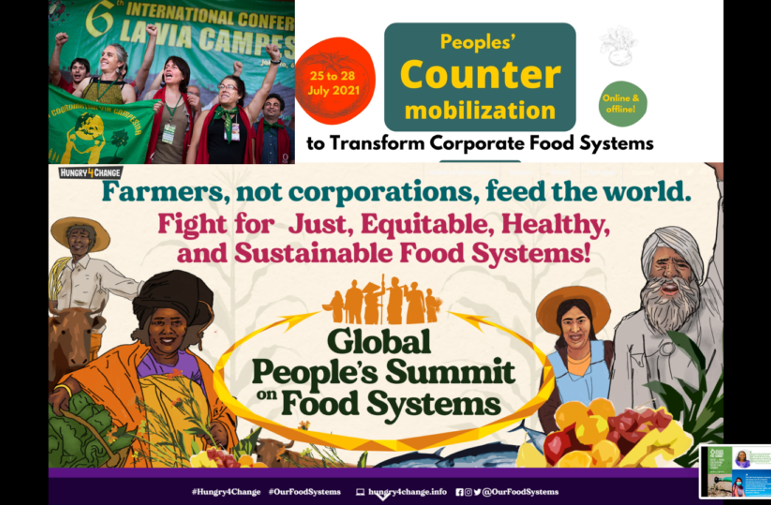The UN Food Systems Summit, held in New York throughout September 2021, has been a source of considerable controversy. Though advertised as a way for ‘global food systems transformation to achieve the Sustainable Development Goals’, others have remained staunchly critical of the Summit. In this new blog post, Priscilla Claeys (CAWR), Matt Canfield (Leiden University), and Jessica Duncan (Wageningen University) explore the ways in which ‘food systems’ and ‘multi-stakeholderism’ are combining to undermine existing democratic processes and exclude certain actors.
By replacing multilateralism with multi-stakeholderism, the UN Food Systems Summit (UNFSS) is advancing a vision of food systems governance that sets the foundation for stronger corporate influence both of the UN and food systems at large. At the same time, this trend is weakening spaces where food sovereignty movements have secured the right to participate.
UN summits have historically played a key role in shaping political responses to global food crises as well as reconfiguring existing global governance arrangements. Past summits reconfigured the institutional architecture dedicated to addressing global hunger. In 2019, the UN Secretary General called for the UNFSS to be held in 2021, an event that differed significantly in its normative organization from past summits.
Setting the stage for the UNFSS
Prior to the UNFSS, UN food summits were organized as multilateral events. Authority was vested in nation-states. Significant changes occurred during the 2009 World Summit on Food Security that set the stage for the 2021 UNFSS. A network of powerful agro-exporting states and transnational corporations sought to evade responsibility for the 2007-08 global food crises by continuing to exploit the fragmented food governance landscape. Transnational agrarian movements, meanwhile organized a Parallel Forum in 2009 called “People’s Food Sovereignty Now!” to challenge the inaction of powerful states and international institutions, and denounce the human rights abuses of transnational corporations. The same year, they successfully pushed for the reform of the UN Committee on World Food Security (CFS) and advanced their vision of democratic and inclusive multilateralism. Through the reform, the CFS became a laboratory for experimenting and designing a new format for global food security governance premised on: evidence-based decision-making and participation/inclusivity. Within that structure, civil society secured the right to autonomously self-organize its participation so as to foster diversity, prioritize the voice of those most affected, and speak with one voice.
The CFS has significantly transformed the conditions through which authority and legitimacy were historically constructed in global food governance. The process for developing recommendations includes comprehensive knowledge assessments by the High Level Panel of Experts (HLPE) and inclusive negotiations that contribute to the authority of the CFS. The inclusion of the voices of those most affected by food insecurity who have the capacity to not only bring local-level issues to the global stage, but also to bring CFS policy recommendations and guidelines to the local level, has also endowed the CFS with significant legitimacy. Together these features have made the CFS an appealing new governance model.
However, the success of transnational social movements and civil society organizations in shaping global food governance also faced a series of blows and backlash. In 2018 and 2019, the United States’ Ambassador to the Rome-Based Agencies rebuked the Food and Agriculture Organization (FAO) for supporting agroecology. In 2020, da Silva’s replacement, Qu Dongyu, signed a partnership with CropLife, a pesticide company, signaling internal divisions within FAO but also pressures from powerful actors. As powerful actors organized to challenge the political space created by food sovereignty movements across UN spaces, they drew on the same strategies that actors have long drawn on when they have sought to reset global food governance: a global summit.
Three features that distinguish the UNFSS from past Summits
The UN Food Systems Summit was the direct result of a strategic partnership that the UN Secretariat signed with the World Economic Forum (WEF) in July 2019. Since the 2007-08 global food and financial crises, the WEF has pursued a closer relationship with the UN in an express bid to redesign global governance in ways that entrench the corporate sector through market-oriented forms of governance. Through their partnership, this powerful group of actors was able to set the agenda for the Summit and ensure that the leadership of the Summit was drawn from its networks.
Three key features distinguish the UNFSSS from past Summits.
First, the Summit adopted a multi-stakeholder structure. Previous Summits have been organized through multilateral institutions of the UN and have respected the normative framework of public international law through which the UN has generally operated. By contrast, the UNFSS is seeking to establish a case for legitimacy through a claim at broad-based and unprecedented participation and the framing of the Summit of a ‘People’s Summit.’ It is advancing a model of multi-stakeholder governance backed by powerful actors, while simultaneously bypassing the multilateral spaces where states already come together to take decisions. The Secretary General’s final statement to the UNFSS reinforces the vision of legitimacy promoted by the powerful network of actors that lead the UNFSS, with its vague framework of participation and vision of accountability centered on “action” and solutions.
Second, the UNFSS focused not on food security but on food systems. The concept and framework of food systems has been developed over the past three decades by researchers and civil society actors to promote a more holistic approach to food production and provisioning. The food systems framing signals the importance of connecting fields of global governance (climate, trade, finance, agriculture, investment) that have been hitherto distinct, so as to address siloed decision-making processes across various governance arenas. Yet it also enables the incorporation of new actors that hitherto may not have been deemed legitimate, such as corporations and philanthropies. As multi-stakeholderism is now facilitating the incorporation of all of these actors into global governance, these new actors are increasingly trying to shape the terms by which food systems governance is deemed legitimate.
Third, the Summit included a Scientific Group that helped to set the agenda for the Summit. The Scientific Group, which is composed almost entirely of economists and natural scientists, developed a mechanistic definition of food systems that maintained many of the assumptions of the Western productivist approach to food and agriculture. It framed each of the Action Tracks through an agenda-setting paper, using ‘science, technology, and innovation’ as the primary evaluative framework for assessing food systems transformation. This stands in opposition to the holistic, agroecological framework that social movements advocate for, which draws on broader forms of practice-based knowledge by small-scale, indigenous, and women food producers (who continue to be the primary food producers).
The Scientific Group has sought to institutionalize its authority by calling for a Science-Policy Interface (SPI) that will continue to provide scientific advice to guide food systems transformation, despite ongoing commitments by the UN Secretariat that they will pursue no new structures of governance as a result of the Summit. The pursuit of a new SPI for food systems has generated extreme polarization among academics, activists, and policymakers. Those concerned are worried that a new SPI would institutionalize the leadership’s narrow vision of science, technology, and innovation; would lack a strong grounding and connection to policymaking process; and, would be designed to bypass the HLPE and the CFS.
 The UNFSS is reshaping global food systems governance
The UNFSS is reshaping global food systems governance
Food systems governance is a dynamic and contested sphere, constituted by competing networks with unequal resources, influence and power. Over the last two years, competing global networks struggled to imbue very different visions of authority and legitimacy into the Summit, initiating a global struggle over the redesign of the architecture of global food governance. The three features outlined above shaped the political terrain through which actors and networks engaged in the Summit.
Whereas the multilateral framework through which global food governance has long located authority in the nation-state and hinged legitimacy on states’ fulfillment of their duties and obligations under human rights, the multi-stakeholder framework reflects notions of participation and accountability that enable powerful corporate actors to pursue their interests while diluting the voices of rights-holders. With no clear financing mechanisms, no clear role for governmental leadership and limited transparency, it is very likely that the UNFSS solutions that offer investment and profit opportunities will see a larger share of capital and investment, at the expense of other, often community-driven solutions. How the UNFSS will ultimately shape the architecture of global food governance is an open question. But it remains clear that the corporate sector seeks to promote the UNFSS as the blueprint for reform.
This article was adapted from a longer article written by Matthew Canfield, Jessica Duncan, and Priscilla Claeys





